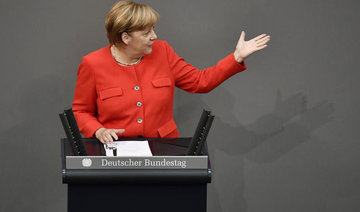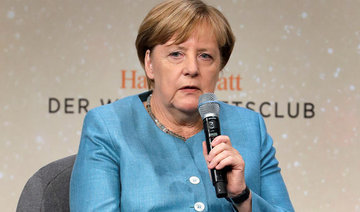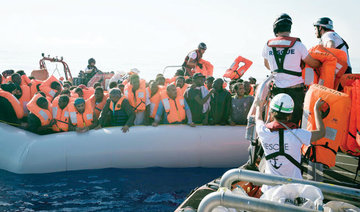BERLIN: Chancellor Angela Merkel warned German voters on Wednesday not to risk allowing an untested left-wing alliance to take power after this month’s national election, urging them to stick with her in “turbulent times.”
Less than three weeks before the Sept. 24 vote, politicians and media in Germany are turning their attention to the possible coalitions that could form after the election, from which no single party is expected to emerge with a clear majority.
Merkel, 63, leads a “grand coalition” of her conservatives and the left-leaning Social Democrats (SPD) — a tie-up neither wants to repeat after the vote. Seeking a fourth term, Merkel is stressing her credentials as a global stateswoman.
“Our country can’t afford experiments — especially in these turbulent times,” she told a rally in Torgau, some 70 miles (120 km) south of Berlin in the state of Saxony.
Merkel spoke above a cacophony of jeers and whistles from some protesters — a feature at many of her rallies as resentment persists at her decision in 2015 to open Germany’s borders to hundreds of thousands of refugees fleeing war in Syria and Iraq.
That decision helped the rise of the anti-immigrant Alternative for Germany (AfD) party, which punished her conservatives in regional votes last year.
She has since bounced back, but the national election is likely to return a more fractured parliament due to the rise of the AfD — set to enter the Bundestag for the first time — and the expected return of the pro-business Free Democrats (FDP).
This could make coalitions harder to form.
Merkel wants to avoid being outflanked by a coalition of the SPD, the far-left Linke and the environmentalist Greens, who have held exploratory talks about the possibility of joining forces in a so-called ‘Red-Red-Green’, or ‘R2G’, coalition.
“I say Red-Red-Green would be bad for our country,” she told the rally. “In the future too, we will need stability and security.”
In a televised debate with SPD leader Martin Schulz on Sunday, Merkel challenged him to rule out a coalition with the Linke party, which he refused to do.
A Red-Red-Green combination is untested at federal level, though the three parties have teamed up to take control of Berlin’s city government.
An opinion poll released on Wednesday put support for Merkel’s conservatives at 38.5 percent, ahead of the SPD on 24 percent. The Greens were on 7.5 percent, the Free Democrats on 10 percent and the Linke and the AfD each on 8 percent.
Resentment at Merkel’s open-door policy runs particularly high in eastern Germany, but she has also been booed at rallies in the west — such as in Ludwigshafen, 45 miles (70 km) south of Frankfurt, last week.
“We are Germans. She needs to be taking care of us,” Vincent Raap, an 18-year-old starting an apprenticeship as a machine operator, said at the Ludwigshafen rally.
“Three times, an apprenticeship for which I had applied was given to foreigners instead,” he said, holding a sign saying “Merkel must go.”
Germany’s Merkel tells voters: ‘Don’t experiment’ with the left
Germany’s Merkel tells voters: ‘Don’t experiment’ with the left

Twelve children and teens drown in I.Coast boat capsize: minister
The outing was organized by a Methodist church in Tiaha
ABIDJAN: A boat overturned during a church outing for Easter on a lagoon near the city of Abidjan in Ivory Coast, killing 12 children and teenagers, a government minister told AFP Tuesday.
“Twelve bodies have been recovered and are being taken to the morgue,” said Sports Minister Adje Silas Metch, who went during the night to the site of the accident late Monday.
The bodies are “of children and adolescents,” he added, saying one was a youngster who was not from the church but had joined the boat crossing.
“Four people were rescued,” he said.
Young people from the village of Tiaha had gone to another village to take part in the “Galilee” event to mark the resurrection of Jesus Christ.
The outing was organized by a Methodist church in Tiaha, about 60 kilometers (40 miles) from the economic capital, Abidjan, Gerard Gbato, deputy chief of the Dabou police district, told AFP.
“It was on the way back that the tragedy happened. The canoe’s engine stopped at one point, the canoe overturned,” he said.
It is possible the boat was overloaded, he added.
Police have opened an investigation.
Gbato said that such dugout canoes with an engine were commonly used by the local community.
The lagoon winds between the districts of Abidjan and the towns surrounding the metropolis of more than six million inhabitants.
Vance calls for greater ties with India, hails progress on trade talks

- “I believe there is much that India and America can accomplish together,” Vance said
- The Trump administration “seeks trade partners on the basis of fairness and shared national interest
NEW DELHI: US Vice President JD Vance on Tuesday called for enhanced engagement with India and said that the South Asian country should buy more defense equipment and energy from the US and allow Washington greater access to its market, lending momentum to an expected bilateral trade deal.
Vance, who is on a four-day visit to India, said that he and Prime Minister Narendra Modi made progress on trade talks during their discussions on Monday, and confirmed that both sides had finalized the terms of reference for the trade negotiation — a vital step toward setting the road map for the final agreement.
India and the US hope to seal a bilateral trade agreement this year and have set an ambitious target of more than doubling their bilateral trade to $500 billion by 2030. If achieved, the trade deal could significantly enhance economic ties between both countries and potentially strengthen diplomatic ties as well.
“I believe there is much that India and America can accomplish together,” Vance said at an event in the western city of Jaipur, where he, his wife Usha Vance and their three children were on a sightseeing tour.
Vance’s first visit to New Delhi came amid the backdrop of US President Donald Trump’s partially-paused tariff program against most countries, including India. Earlier this month, Trump announced a 90-day pause in which imports from most countries would face a baseline 10 percent tax so that there was time to hold talks and possibly structure broader deals.
The trade negotiations are especially urgent for India and could help New Delhi avoid sharp US tariffs. Meanwhile, the Trump administration has portrayed its strategy of tariffs as forcing negotiations that could limit the reach and influence of China, the world’s dominant manufacturer and New Delhi’s main rival in the region.
At the event, Vance sought to assuage fears over Trump’s tariff decisions and said his administration was seeking to rebalance global trade so that the US, with friends like India, can build a better future. He said that trade relations must be based on fairness.
“I come here with a simple message,” Vance said. The Trump administration “seeks trade partners on the basis of fairness and shared national interest. We want to build relationships with our foreign partners who respect their workers.”
Vance said that he was in India to strengthen ties between both nations, and criticized previous governments for looking at New Delhi as a cheap source of labor.
“I believe that if India and the United States work together successfully, we are going to see a 21st century that is prosperous and peaceful,” he said, adding that if this didn’t happen, it would mean a “dark time for all humanity.”
Washington has long sought to develop a deeper partnership with New Delhi, which is seen as a bulwark against China. Modi has established a good working relationship with Trump, and the two leaders are likely to further boost cooperation between their countries.
Modi was also among the first leaders to visit the US and hold talks with Trump that kickstarted a negotiation process to minimize the possible fallout of Trump’s tariffs. The two leaders also said they planned to grow their defense partnership.
India is a close partner of the US and is part of the Quad, which is made up of the US, India, Japan and Australia, and is seen as a counterbalance to China’s expansion in the region. It is also a major defense partner of the US, a status only enjoyed by some of the closest allies of Washington.
In line with Trump’s push for supplying more military equipment to India, Vance said Washington was seeking greater collaboration with New Delhi for the sale of advanced military gear, as well as coproduction. He also pitched Washington’s fifth-generation stealth fighter to India.
“F-35 will help protect your people like never before,” he said.
Over the past several decades, India has been largely dependent on Russian weapons, fighters and military equipment, but has gradually started diversifying its purchase basket from countries such as the US, France and the UK
In recent years, India has embedded advanced American jets, helicopters, missiles and other equipment into its armed forces and the two countries have announced plans to sign a 10-year framework later this year to further strengthen the defense partnership.
Philippines, UAE sign agreement to combat cybercrime, drug trafficking

- New deal provides ‘strategic framework’ for cooperation, Philippine ambassador says
- UAE is the only country in the Middle East where Philippines has defense attache
MANILA: The Philippines has signed a new security agreement with the UAE to tackle transnational and organized crime, officials said on Tuesday.
Signed by Philippine Interior Secretary Juanito Victor Remulla and UAE Interior Minister Sheikh Saif bin Zayed Al-Nahyan, the new deal focuses on cybercrime, drug trafficking and human trafficking.
“Transnational crimes with global networks powered by new technologies and the ease of cross-border movement of persons and criminal syndicates need more international cooperation and partnerships,” Alfonso Ver, Philippine ambassador to the UAE, told Arab News on Tuesday.
“This is one concrete step to address the growing menace above … We have gone into new and heretofore unexplored areas of bilateral cooperation, moving beyond the issues of OFWs (Overseas Filipino Workers), migration and oil.”
The Philippines and the UAE celebrated 50 years of diplomatic relations last year.
The two countries have been working to expand security ties over the past few years, with discussions ongoing for a wide-ranging bilateral defense pact.
In 2021, the Philippines posted a defense attache in the UAE, making it the only country in the Middle East where Manila has such representation.
The two countries also signed several treaties on extradition, mutual legal assistance and transfer of prisoners in February.
Ver said the new agreement was a “milestone” that provides a “strategic framework” that will help guide Philippine-UAE “future engagements in a more structured, sustainable, and effective” manner.
It is also expected to promote the exchange of best practices and expertise.
“We discussed ways to strengthen bilateral relations between the two friendly countries and develop cooperation in the security and police fields,” Sheikh Saif said in a post on X, referring to his meeting with Remulla.
“This underscores our shared commitment to supporting effective international institutional cooperation to enhance the security and stability of societies.”
Cybercrime and trafficking have been growing concerns for countries like the Philippines.
More than 200 Filipinos were among several thousand people freed in late February and March from online scam centers run by syndicates operating along Myanmar’s border with Thailand, where many of them are believed to have been recruited and trafficked by criminal gangs.
Lured by well-paid job offers in Thailand, they were released in a weeks-long, highly publicized crackdown by Thai, Myanmar and Chinese forces.
Bangladesh’s largest private airline starts Riyadh flights as demand grows

- US-Bangla Airlines offers 5 weekly flights on Dhaka–Riyadh route
- First private Bangladeshi carrier to operate flights to the Kingdom
DHAKA: US-Bangla Airlines, the largest airline in Bangladesh by fleet size, has launched direct flights from Dhaka to Riyadh amid increasing demand for travel to Saudi Arabia.
The inaugural flight from Hazrat Shahjalal International Airport to King Khalid International Airport took off on Monday, with 423 passengers on board.
The flights will run five times a week on an Airbus 330 aircraft, with plans to gradually expand to daily service.
“Today, also, we are flying with full occupancy. There is always demand for destinations in the Middle East,” Kamrul Islam, the carrier’s general manager for public relations, told Arab News on Tuesday.
“We are receiving very good responses from the passengers ... The route will soon be served by daily flights.”
The airline is tapping into the growing market for Middle East travel. Flights to Saudi Arabia have been too few to accommodate the needs of some 3 million Bangladeshi workers in the Kingdom and hundreds of thousands of people traveling for the annual Hajj and Umrah pilgrimages.
In August last year, it launched daily flights to Jeddah, becoming the first — and so far the only — private Bangladeshi airline to fly to the Kingdom.
“Our aim is to start flight operations gradually in all the destinations where Bangladeshi migrants live,” Islam said.
“In the near future, we are planning to begin flight operations to Dammam and Madinah. Our plan is to begin these flights by the next year. It takes six to seven months of preparations to launch a new station.”
Founded in 2010, US-Bangla Airlines started as a domestic carrier and has lately expanded its routes to go international. The Riyadh route marks the airline’s 14th international destination and sixth in the Middle East.
“Every destination in the Middle East is a base for Bangladeshi migrants,” Islam said.
“We are currently operating also to other places in the region, like Dubai, Sharjah, Abu Dhabi, Muscat, and Doha.”
With its latest acquisition of new Airbus A330 and Boeing 737 aircraft last year, the carrier has become the largest airline in Bangladesh by fleet size.
With the additions, the US-Bangla fleet now consists of 24 aircraft, while the national flag carrier Biman has 21.
UN food agency to halt aid for 650,000 women, children in Ethiopia

ADDIS ABABA: The World Food Programme said Tuesday that it was suspending aid for 650,000 malnourished women and children in Ethiopia due to a lack of funding.
“WFP is being forced to halt treatment for 650,000 malnourished women and children in May due to insufficient funding. WFP had planned to reach two million mothers and children with life-saving nutrition assistance in 2025,” the UN agency said in a statement.
















